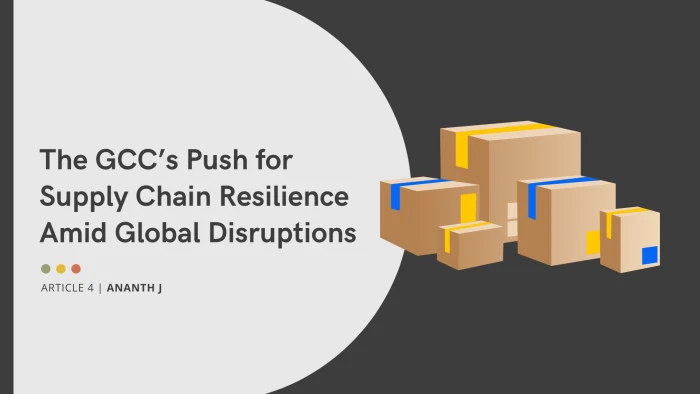In 2024, 90% of companies faced supply chain disruptions, underscoring the urgent need to strengthen resilience. As global economic and geopolitical uncertainties persist, building robust supply chains has become a top priority for businesses worldwide. In response to these challenges, there’s been a clear shift in strategy—73% of companies have adopted dual-sourcing models, while 60% are actively regionalizing their supply chains to reduce dependency and improve agility.
The GCC nations—Saudi Arabia, the UAE, Qatar, Kuwait, Oman, and Bahrain—are strategically positioned as global trade hubs, yet they face unique challenges due to their reliance on imports, geopolitical uncertainties, and climate-related issues.
Recent global events, such as the Russia-Ukraine conflict and disruptions in the Red Sea trade routes, have highlighted the vulnerabilities in logistics. This is why GCC businesses are actively reinventing logistics frameworks to ensure stability and continuity.
Key Strategies to Build Resilient Supply Chains
1. Diversification of Supply Sources
GCC member nations are increasingly becoming inclined toward Asia's developing markets, which currently account for over 70% of all GCC gas and oil exports. However, it’s worth noting that up to 65% of electrical machinery and equipment and 85% of food are imported into GCC nations, marking a heavy reliance on imports.
To tackle this, it’s necessary to reduce dependency on single-source suppliers by expanding trade networks. This diversification minimizes risks associated with geopolitical tensions and trade restrictions. By sourcing from multiple suppliers across different regions, companies can ensure a steady flow of goods even if one supply route is disrupted.
Additionally, partnering with local manufacturers can also reduce reliance on imports and strengthen domestic production capabilities.
2. Nearshoring and Friendshoring
Nearshoring—sourcing goods from geographically close nations—and friendshoring—partnering with politically stable countries—is another impactful strategy to improve stability. These approaches reduce dependency on distant suppliers, enhance security and ensure uninterrupted supply chains. Nearshoring also helps reduce transportation costs and lead times, making logistics more efficient.
3. Strategic Stockpiling
Governments and businesses in the GCC are investing in strategic stockpiling of critical materials, including food, energy products, and industrial components. This approach acts as a buffer against supply chain disruptions, promoting business continuity during crises. For instance, the UAE has developed extensive food security programs that include stockpiling essential commodities to mitigate risks associated with global shortages. Similarly, Saudi Arabia has established reserves for key industrial materials to support manufacturing and infrastructure projects.
4. Digital Transformation and AI Integration
The adoption of digital technologies, including artificial intelligence (AI), blockchain, and IoT, is revolutionizing supply chain management in the GCC. By 2028, AI is expected to make supply chains 45% more efficient in timely and error-free product delivery.
AI-driven predictive analytics help businesses anticipate disruptions and optimize logistics operations, while blockchain enhances transparency and security in trade transactions. Companies are leveraging AI to forecast demand fluctuations and automate inventory management, reducing inefficiencies. Blockchain technology is also being used to track shipments in real time, ensuring greater visibility and reducing fraud risks.
5. Infrastructure Development and Regional Collaboration
Major infrastructure projects, such as the King Hamad Causeway linking Bahrain and Saudi Arabia, are strengthening regional connectivity. Additionally, the GCC railway project aims to create a seamless transportation network across member states, facilitating efficient trade and logistics. It is anticipated that investments in its railway infrastructure will create an 8,000-kilometer rail network, extending from the current 3,650-kilometer track that connects Jubail Industrial Port and Dammam Industrial.
These initiatives are designed to reduce dependency on external logistics providers and improve the movement of goods within the region. The development of smart ports and automated warehouses is further enhancing supply chain efficiency.
Case Studies: Initiatives in GCC Leading the Way
Several initiatives in the GCC have emerged as pioneers of change in supply chain resilience:
Saudi Arabia’s Vision 2030 Initiative: The Kingdom is investing heavily in local manufacturing and logistics hubs to reduce import dependency. The initiative aims to enhance domestic production capabilities and create a more self-sufficient economy.
Further, the Kingdom has launched over 85 initiatives under the Saudi Green Initiative, including 60 eco-friendly supply chain initiatives
UAE’s Global Sea-to-Air Hub: The UAE has streamlined cargo movement through its sea-to-air logistics hub, ensuring rapid turnaround times for shipments. This model has significantly reduced transit delays and improved supply chain efficiency.
Bahrain’s Trade Facilitation Measures: Bahrain has established mutual recognition agreements with Saudi Arabia to fast-track trade and reduce bottlenecks. These agreements have led to smoother customs processes and enhanced cross-border trade
As global supply chain disruptions continue to pose challenges, GCC businesses are proactively reinventing logistics for stability. One of the most significant shifts in supply chain management is the transition from traditional, linear models to dynamic, adaptive ecosystems. Businesses are no longer relying solely on historical data to predict disruptions; instead, they are leveraging real-time analytics, AI-driven forecasting, and blockchain transparency to create agile supply chains that can respond to crises instantly. This shift ensures that companies can anticipate risks rather than merely react to them.
By embracing diversification, digital transformation, and regional collaboration, the region is building resilient supply chains that can withstand future uncertainties. These efforts not only safeguard economic stability but also position the GCC as a global leader in supply chain innovation.
Sources:
https://www.weforum.org/stories/2024/12/gulf-countries-supply-chain-resilience/
https://www.saudilogisticsexpo.com/saudi-arabia-logistics-report-2024/
https://www.mckinsey.com/capabilities/operations/our-insights/supply-chain-risk-survey
https://www.xeneta.com/blog/the-biggest-global-supply-chain-risks-of-2025/
https://www.zawya.com/en/opinion/how-uae-and-saudi-arabia-are-tackling-food-security-issues-tl0chr09
https://www.mckinsey.com/capabilities/operations/our-insights/supply-chain-risk-survey


